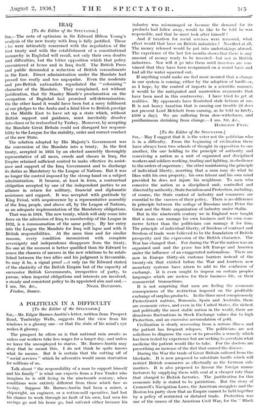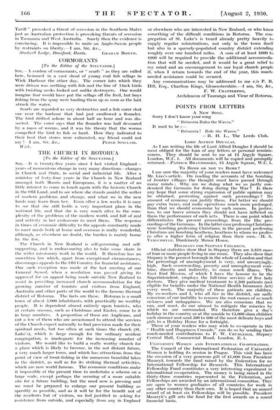[To the Editor of the Scae-rxron.] Stn,—May I suggest that
it is the voter not the politician who
is in a difficulty. From the beg' g of eiviti,ition there have always been two schools of thought in opposition to one another, the one holding to the principle of authority and conceiving a nation as a unit of organized and disciplined workers and soldiers working, trading and fighting, in obedience to the orders of supermen ; the other maintaining the principle of individual liberty, asserting that a man may do what he likes with his own property, his own labour and his own mind provided he does not injure his neighbour. To men who conceive the nation as a disciplined unit, controlled and directed by authority, State Socialism and Protection, including, of course, the State control of industry and commerce are essential to the success of their policy. There is no difference in principle between the serfage of Russians under Peter the Great and the State organization of industry under Stalin.
But in the nineteenth century we in England were taught that a man can manage his own business and his own com- merce better than the politicians can manage it for him. The principle of individual liberty, of freedom of contract and freedom of trade were believed to be the foundation of British prosperity and the expression of the British character. The War has changed that. For during the War the nation was an organized unit and the peace has left Europe and America under the influence of an exaggerated nationalism. There are now in Europe thirty-six customs barriers instead of the twenty-six that existed before the War and fourteen new monetary systems have arisen to add to the confusion of exchange. It is even sought to impose on certain peoples languages which are useless for their business life, or their commercial transactions.
It is not surprising that men are feeling the economic consequences of the restriction imposed on the profitable exchange of surplus products. in the three most conspicuously l'rotectionist nations, Rumania, Spain and Australia, there are economic crises, and even in the United States, the richest and politically the most stable nation in the world, there are disastrous fluctuations in Stock Exchange values due to high Protection, and an excessive accumulation of gold.
Civilization is slowly recovering from a serious illness and the patient has frequent. relapses. The politicians are not solicitous to diagnose the ease or to prescribe a remedy which has been tested by experience but are seeking to ascertain what medicine the patient would like to take. For the doctors are prescribing an increase of the diet that caused the disease.
During the War the trade of Great Britain suffered from the blockade. It is now proposed to substitute tariffs which will restrict British commerce as effectually as the German sub- marines. It is also proposed to favour the foreign manu- facturers by supplying them with coal at a cheaper rate than that charged to British factories. The justification for this economic folly is stated to be patriotism. But the story of Cromwell's Navigation Laws, the American smugglers and the Boston tea party show that an Empire cannot be held together by a policy of restricted or dictated trade. Protection was one of the causes of the American Civil War, for the " Black Tariff " provoked a threat of secession in the Southern States just as Australian protection is provoking threats of secession in Tasmania and West Australia. Surely then the evidence is convincing. It is impossible to unite an Anglo-Saxon people by restraints on liberty.—I am, Sir, &e.,
Shahvell Lodge, Droaford, Hants. GRAHAM BOWER.

































 Previous page
Previous page